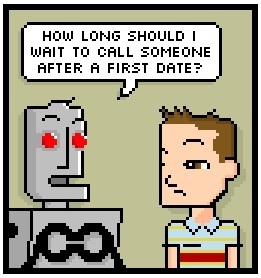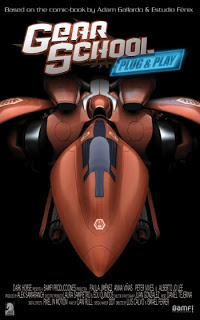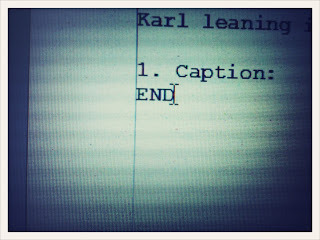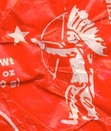Adam Gallardo's Blog, page 7
October 10, 2011
Thing to read, listen to 10/10/11
The Broadcast of Comics
Warren Ellis has a new, long think-piece about digital comics and web comics. This is relevant to my interests, of course.
Ian Fleming interviews Raymond Chanlder
Via the very fine SuperPunch.com, comes this 24-minute long interview featuring two masters of their craft.
The transcript of this talk may be found here.
Modern Horror Defined by Edgy Realism of the 1970s
FInally, from NPR.org come this nice piece about the current state of the horror genre. The article also includes a link to an excerpt of Shock Value which is a book that I think I'll have to put on my to-read list.
Warren Ellis has a new, long think-piece about digital comics and web comics. This is relevant to my interests, of course.
Ian Fleming interviews Raymond Chanlder
Via the very fine SuperPunch.com, comes this 24-minute long interview featuring two masters of their craft.
The transcript of this talk may be found here.
Modern Horror Defined by Edgy Realism of the 1970s
FInally, from NPR.org come this nice piece about the current state of the horror genre. The article also includes a link to an excerpt of Shock Value which is a book that I think I'll have to put on my to-read list.
Published on October 10, 2011 21:11
October 6, 2011
Talking with Richard Stevens
Thisis the first in a very occasional series of interviews I plan to do.These first posts will concentrate on my new-found obsession: Webcomics.
 DieselSweeties.com ® R StevensIfyou're reading this, that means you're on the Internet and if you'reon the Internet, then you probably already know who Richard Stevensis. For those out of the loop, Stevens is the creator of the wildlypopular DieselSweeties.com. And Diesel Sweeties is among the firstgeneration of web comics. It's been in existence for eleven yearsnow. It's stood the test of time and the fickle tastes of amedia-saturated audience. And it's funny, too. Can't forget that.
DieselSweeties.com ® R StevensIfyou're reading this, that means you're on the Internet and if you'reon the Internet, then you probably already know who Richard Stevensis. For those out of the loop, Stevens is the creator of the wildlypopular DieselSweeties.com. And Diesel Sweeties is among the firstgeneration of web comics. It's been in existence for eleven yearsnow. It's stood the test of time and the fickle tastes of amedia-saturated audience. And it's funny, too. Can't forget that. Stevenswas nice enough to answer some questions about how he goes aboutmaking his web comic and how he balances it with the business that ithas inspired. (Short answer: He doesn't).
I'dlike to thank him very much for taking the time to speak to me.
AG:What led you to pursue web comics versus print comics?
RS:I never saw any kind of divide between the two. When I started(eleven years ago!) there wasn't much in the way of a professionalweb comics scene. The plan was to try out comic concepts online andget feedback before going to print. I just wound up never leaving.
AG:And what was the inspiration behind creating Diesel Sweeties?
RS:I wanted to write about relationships and thought that robots wouldmake a good stand-in for clueless men. It spiraled out of control andinto more of an ensemble cast gag strip and I was powerless to stopit.
AG:You did a syndicated version of Diesel Sweeties for a time, but thenstopped. Can you talk about that experience and why you decided tocease the syndicated strip? The old paradigm of comics seems like itwas you tried as hard as you could to get into syndication and thenyou did everything you could to maintain it.
RS:I did the syndicated version as an experiment when I was approachedby an acquisitions editor for a now-dead major syndicate. I neverplanned to or wanted to be in newspapers, but I figured I'd bestupid to turn down those guaranteed riches! The joke was on me whenI found out that newspaper comics sections were shrinking and fairlycalcified. I got out of my contract as soon as legally possible,thanks to a clause about a minimum level of income that I was nowherenear earning.
AG:Can you talk, in general terms, about the merchandise you sell on thesite? It seems that most web comics make money off of the things theysell. Was that part of your strategy going into the field, or was itsomething that developed over time?
RS:I can't speak for other cartoonists, but I really enjoymerchandise. I've always bought t-shirts and books and dumb littleawesome things, so offering them to people seemed like a natural fitfor me. This doesn't work for everyone. My theory is that youreally have to like what you're selling to sell it. Like everythingelse about my early business plan, the only plan was that there wasno plan. (it didn't hurt that I had a job at the time.)
AG:Were there strips you attempted before you tried Diesel Sweeties?
RS:Nothing major, notable or archived. I did minicomics in college, butthey are long gone.
AG:While there are recurring characters and plot lines that develop overtime, Diesel Sweeties feels like a gag strip. Have you everconsidered doing something with more of a narrative arc?
RS:It feels like a gag strip because that's what I'm aiming for. Mygoal has always been to write as close to Peanuts as I can but withcharacters who have sex. I've written and pitched some longerworks. Nothing's come to fruition yet, but it's certainlysomething I see myself doing.
AG:As a follow up, It feels like most successful web comics are gagstrips. Do you think it would be possible for a narrative strip tocatch on in the same way as gag strips?
RS:I guess it depends on your definition of "catch on". Storycomics are harder to merchandise, but I imagine they could moreeasily sell books. (or sell book rights to publishers) We live in aworld of apps and ebooks nowadays. There's no reason a narrativecomic couldn't be fabulously successful.
AG:When was the moment you knew that you were going to succeed? Did yougo into the web comics business with a definable end goal, or was itmore organic?
RS:I started with no goal and hopefully will never feel like I'vesucceeded. Even now, I still wonder how much longer I can survive asan independent artist. Hopefully a little longer!
AG:Do you follow a routine throughout the day? If so, can you describeit?
RS:I tend to do "office work" in daylight and creative work atnight. My drawing and writing time is generally from about 9pm tomidnight. My days are filled with t-shirt folding and mailing anddesigning and every other one of the billion tasks that pay thebills. Most days, I don't know what I'll be doing until I'vedone it.
AG:How do you balance the creative and business aspects of DieselSweeties?
RS:I daresay I don't have any balance in any aspect of my work life. Inever miss deadline and never give up that window of comics time atthe end of the day. That's the closest I can think of.
AG:And how does social media fit into the mix? You seem particularlyactive on Twitter. Is this part of an overall strategy to drivetraffic to the site, or are you just blowing off steam?
RS:Twitter feels like it was designed for me. I used to throw silly awaymessages on my IM and screw around on message boards. Nowadays, I getto do my goofy short writing for a large audience. I see it as acombination of communication and a second comic strip. It cracks meup when people following me have no idea I draw a comic but stickaround for my puns.
AG:Do you see yourself continuing with Diesel Sweeties forever, or doyou think you might end it someday to pursue other creative ventures?
RS:Couldn't say. I think if I thought about the end, I'd loseinterest. I am mentally committed to hitting 3,000 comics and willgive it some thought then. That'll be somewhere around twelve yearsof work!
AG:Is there any parting advice you'd give to someone consideringstarting up a web comic?
RS:Don't be one of those jerks who posts an update schedule on yoursite only to constantly apologize for missing deadlines. Just be whoyou are and work at the best pace you can. Never apologize foranything. Do your work and get better every day.
Published on October 06, 2011 12:00
October 4, 2011
Some things to read 10/3/11
SupersWhen Warren Ellis thinks about comics, I generally pay attention. If you're interested in the medium, too, so should you. This time he's thinking about rhetorical comics.
PeopleDid you know that Google publish a quarterly ezine? Well, they do, and it's packed full of interesting looking articles.
Kindle Launches Graphic Novel Price WarICv2 has an interesting piece about the possible effects of DC's exclusivity deal Amazon. Long story short: Sorry, comics retailers!
'Hark!': From DNA to JFK, a Comic Take on HistoryandKate Beaton, History GirlOne of my favorite cartoonists, Kate Beaton, is getting a lot of attention because of her new book, Hark! A Vagrant (which is also the name of her website). This makes me happy.
Alert the Media: LB Goes Indy!I love Lawrence Block's writing. Matt Scudder, the creation of Mr. Block is probably my favorite recurring character in fiction. Mr. Block has been toying with self-publishing a short story here and there for the Nook and Kindle for a year or so. Now he's decided to go big: He's self-publishing a collection of Matt Scudder stories. He's doing it in both electronic and meat-world formats. Good luck to him, and for anyone who's never read the Scudder series, this would be a great place to start. And for just $2.99, too.
PeopleDid you know that Google publish a quarterly ezine? Well, they do, and it's packed full of interesting looking articles.
Kindle Launches Graphic Novel Price WarICv2 has an interesting piece about the possible effects of DC's exclusivity deal Amazon. Long story short: Sorry, comics retailers!
'Hark!': From DNA to JFK, a Comic Take on HistoryandKate Beaton, History GirlOne of my favorite cartoonists, Kate Beaton, is getting a lot of attention because of her new book, Hark! A Vagrant (which is also the name of her website). This makes me happy.
Alert the Media: LB Goes Indy!I love Lawrence Block's writing. Matt Scudder, the creation of Mr. Block is probably my favorite recurring character in fiction. Mr. Block has been toying with self-publishing a short story here and there for the Nook and Kindle for a year or so. Now he's decided to go big: He's self-publishing a collection of Matt Scudder stories. He's doing it in both electronic and meat-world formats. Good luck to him, and for anyone who's never read the Scudder series, this would be a great place to start. And for just $2.99, too.
Published on October 04, 2011 12:00
October 3, 2011
How pencils are made
As you may have guessed from the series of print porn videos I've posted here, I'm fascinated by how things are made. In that tradition, here's a video of the production process used to make pencils. My apologies for the pun that closes out this video. Hey, I didn't write it!

Published on October 03, 2011 22:49
September 29, 2011
Gear School short: The local angle
 The short film based on my comics series, Gear School: Plug and Play has played in festivals all over the US and Europe, a fact that blows me away. But I am humbled by the fact that it has been selected as to screen at my hometown's film fest, The Salem Film Festival. Salem's festival has been named one of the top ten small film fests in the country by Livability.com, so you know it's legit.
The short film based on my comics series, Gear School: Plug and Play has played in festivals all over the US and Europe, a fact that blows me away. But I am humbled by the fact that it has been selected as to screen at my hometown's film fest, The Salem Film Festival. Salem's festival has been named one of the top ten small film fests in the country by Livability.com, so you know it's legit.At the moment, I'm not sure when it will be screened, but I'll update the blog as more information becomes available.
And if you want to see a teaser trailer, I've posted it to this blog before.
Published on September 29, 2011 23:12
September 26, 2011
Why a web comic now?
Since2008, all comics sales – single issue and graphic novels – havebeen in steady decline according to ICV2.com. The one brightspot is that for the first half of 2011, graphic novel sales are upwhile single-issue sales continue to fall. (An aside: DC's rebot oftheir universe has given single-issue comics a bump, but there's notelling how long that bump will last and, once it fades, I don'tthink that DC can reboot its universe again.End of aside) The declinein sales of single-issue comics is significant because comicspublishers have traditionally used these as a loss leader for graphicnovels, toys and other merchandise. The Weekly Standard pointed outthis practice in article, "The Crash of 1993":
Thismight sound like an industry marching toward oblivion, yet in 2009,Disney paid $4 billion to acquire Marvel (DC was already owned by Time-Warner).The reason for this gaudy valuation is that the comicbooks themselves are no longer important to the comic- bookindustry. They're loss leaders. Thereal money is in the comic-book properties, which power toy and merchandise sales, theme parks, and above all elsemovie franchises. Since 1997, 26 comic book adaptations have gone on to gross more than $100million at the box office. Twelve of these grossed more than $200 million. More—manymore—are coming soon to a theater near you.
Italics are mine in that quote, by the way.
Increasingly,publishers are interested only in titles they believe can beexploited across other media, and they are less and less likely totake a chance on unknown properties. Publishingfirst to the web, and gaining a following, seems to be a way tosidestep all of this. Penny Arcade was among the first web comics to garner enough of a fan base towarrant a print edition (Dark Horse Comics published their booksstarting in 2006 and Del Rey stole them away from Dark Horse in2010), but it's not the only one to see this sort of success.Publishers are also using webcomics in place of the traditionalsingle-issue monthlies to build an audience. Avatar Press had greatsuccess with Warren Ellis's FreakAngels .Even first second, the comics imprint of traditional publisher,Macmillan, launched a webcomic, Mark Siegel's Sailor Twain .
Andif one wants to eschew traditional publishers, webcomics are a way toattract an audience and self-publish. There are many examples ofartists doing just this – Richard Steven's DieselSweeties (which also enjoyed arun as a print comic in several weekly newspapers based on itssuccess online), Steve LeCouilliard's Much the Miller'sSon , and Ben Costa's ShiLong Pang, The Wandering Shaolin Monk are recent standouts. The lesson here seems to be that an audiencewill follow you from one medium to the next and, more importantly,support you financially if you can gain their loyalty.
Personally,I am leaning toward self-publishing once The LonelySpaceman is completed, and thereare a few different ways to gain funding for such a project. One isto apply for a Xeric Grant. The Xeric Grants were founded in 1992 byKevin Eastman, of Teen-Age Mutant Turtlefame, with the express goal of helping independent creators pay forthe production of their self-published comics. Tens of thousands ofdollars are awarded every quarter.
Anothermeans of funding your comic is to use a crowd-sourcing website likeKickstarter.com. Kickstarter allows artists to post their projects ontheir site and ask complete strangers to pledge money toward theircreation. Artists are only given the money of their projects arefully funded, but Kickstarter has a great track record of helping toproduce comics. According to Publishers Weekly Kickstarter funds roughly as many projects as DC's Vertigo imprint.And it could be considered the third largest publisher of independentgraphic novels in the US, behind only Dark Horse Comics and IDW. Withthe right pitch, a comics project has a decent chance of beingsuccessfully funded.
Thesefactors, tradtional publishers embrace of webcomics and outsidesources of funds for self-publishers, make me confident that a webcomics project could actually be a viable commercial endevour. Allone needs is a solid comics project.
Is The Lonely Spaceman such a project? I guess we're going to find out.
Published on September 26, 2011 14:35
September 24, 2011
Something you should read, weekend edition
The Big Sexy Problem with Superheroines and Their "Liberated Sexuality."
A couple of days ago, Laura Hudson wrote a great piece over at Comics Alliance about the way mainstream comics represent female sexuality. It really deserves to be read by everyone with an interest in the comics medium
This is something I think a lot about since I like to write female characters. I don't think I'm guilty of any of the offenses mentioned in the essay -- I hope I'm now -- but it's always good to be mindful, right?
A couple of days ago, Laura Hudson wrote a great piece over at Comics Alliance about the way mainstream comics represent female sexuality. It really deserves to be read by everyone with an interest in the comics medium
This is something I think a lot about since I like to write female characters. I don't think I'm guilty of any of the offenses mentioned in the essay -- I hope I'm now -- but it's always good to be mindful, right?
Published on September 24, 2011 22:17
September 23, 2011
What is The Lonely Spaceman?
The basics: The Lonely Spaceman is afull-color, 128-page comic written by me and illustrated by MattHope. It will be published to the web at LonelySpaceman.com (sitecurrently under construction) at the rate of 3 pages per week -- apage will publish every Monday, Wednesday, and Friday. It will golive in mid-November and run for nearly a year.
So, what's the story? Well, it's sortof a SF fable. I also remember Joss Whedon mentioning about someepisodes of Buffy that the metaphor was very thin. You could say thatThe Lonely Spaceman is a very thin metaphor It's about anastronaut who returns to Earth after a 200-year long mission to findthe planet changed beyond recognition. The only way he can deal withit is to wear his pressure suit, his protective shell, everywhere hegoes. The story is about how he learns to live without his protectivecovering. It has space pirates, romance, and a character based onChristina Hendricks in the Broken Bells music video "The GhostInside." So it's got that going for it.
Broken Bells "The Ghost Inside" from Jacob Gentry on Vimeo.
I found references to The LonelySpaceman in various notebooks going back at least two years. Thestory hasn't changed much in that time, except that it used to bedarker (and that it used to be called The Loneliest Spaceman). I decided to make it more whimsical because I thought thatwould be more palatable, and because I thought it would be more funto write. I think everything I write starts out darker than it endsup in the final version. I am working on my issues, thank you verymuch...
As we get closer to the web site'sactual go-live date, I'll be posting reminders. Many, many reminders,so you can check out the final product for yourself.
Next time: Why a web comic now?
Published on September 23, 2011 12:00
September 22, 2011
Some things you should read
My Instapaper page is overflowing with good stuff lately. Here are a few examples. I think I may try and do a more regular links feature...
[A]n orgy of art for its own sake.
I'm lucky to know the graphic novelist, Craig Thompson, and I was very pleased to see his new book, Habibi , reviewed so well in The Guardian.
Embed a Comic Book on any Facebook Page.Frankly, this just seems sort of neat.
Slave Labor... has decided to go digital-only with their periodicals.
This is a reflection of how terrible the comics market is at the moment. And a damn smart move on Slave Labor's part.
WHAT SERIOUS WRITERS CAN LEARN FROM GENRE COMRADES IN ARMS
An interesting read, though I admit to being a bit self-serving since I hope to someday be a successful genre writer.
Ellen Ripley Is Clearly the Best Female Character in Scifi Film, and That's a ProblemJohn Scalzi speaks truth.
[A]n orgy of art for its own sake.
I'm lucky to know the graphic novelist, Craig Thompson, and I was very pleased to see his new book, Habibi , reviewed so well in The Guardian.
Embed a Comic Book on any Facebook Page.Frankly, this just seems sort of neat.
Slave Labor... has decided to go digital-only with their periodicals.
This is a reflection of how terrible the comics market is at the moment. And a damn smart move on Slave Labor's part.
WHAT SERIOUS WRITERS CAN LEARN FROM GENRE COMRADES IN ARMS
An interesting read, though I admit to being a bit self-serving since I hope to someday be a successful genre writer.
Ellen Ripley Is Clearly the Best Female Character in Scifi Film, and That's a ProblemJohn Scalzi speaks truth.
Published on September 22, 2011 22:33
So, there's that done
Published on September 22, 2011 00:04




